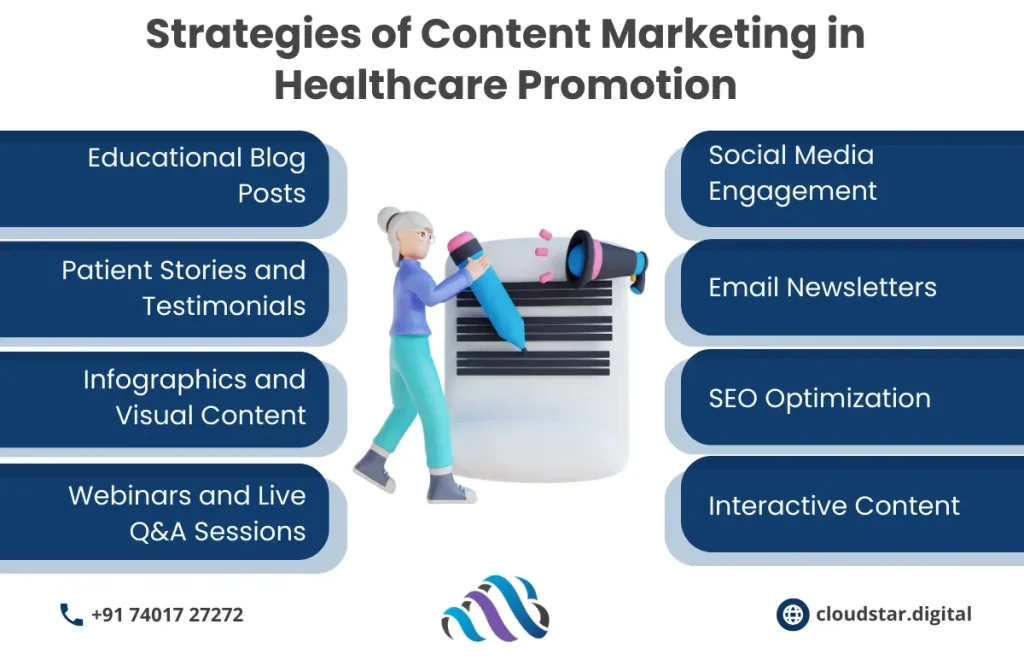In today’s digital age, content marketing in healthcare promotion has become indispensable for reaching and engaging with patients. This comprehensive guide explores the significance of content marketing in healthcare, providing insights into its importance, strategies, and implementation tips to help healthcare companies thrive in the digital landscape.

What is Healthcare Content Marketing?
Healthcare content marketing involves creating and distributing valuable, relevant, and consistent content to attract and engage a defined audience typically patients, healthcare professionals, and caregivers. The goal is to build trust, educate readers, and ultimately drive patient decisions in favor of a healthcare service.
Unlike traditional advertising, healthcare content marketing focuses on delivering insightful information to help patients make informed decisions about their health. Whether it’s blog posts, videos, infographics, or social media content, the information is tailored to address the needs, concerns, and queries of patients at various stages of their healthcare journey.
Key benefits of Healthcare Content Marketing:
- Establishes credibility and trust.
- Improves patient education and awareness.
- Boosts patient engagement with interactive and informative content.
- Increases website traffic and search engine rankings.
The State of Healthcare Content Marketing
In today’s digital landscape, healthcare content marketing is more important than ever. Research shows that nearly 80% of internet users have searched for health-related information online. Patients are not just looking for medical advice; they seek trustworthy sources that offer comprehensive, clear, and actionable insights about their conditions or procedures.
However, despite its growing importance, many healthcare providers still struggle to adopt an effective healthcare content marketing strategy. A recent study revealed that while 90% of healthcare organizations are engaged in content marketing, only 41% believe they are doing it effectively. Common challenges include a lack of clear objectives, insufficient resources, and poor targeting.
4 Healthcare Content Marketing Tips
To create an impactful healthcare content marketing strategy, it’s essential to follow proven tips that can optimize patient engagement and help your healthcare organization stand out. Here are four practical healthcare content marketing tips to elevate your content strategy:
1. Understand Your Audience
One of the foundational elements of content marketing in healthcare promotion is knowing who your target audience is. Are you trying to reach patients, doctors, or other healthcare professionals? Once you define your audience, you can create content that addresses their specific needs, concerns, and preferences.
How to understand your audience
- Conduct patient surveys to identify common questions or concerns.
- Use analytics tools to track the performance of existing content.
- Segment your audience based on demographics, conditions, or healthcare interests.
2. Focus on Educational Content
Educational content is the cornerstone of healthcare content marketing. Patients often look for answers to specific medical concerns, and by providing educational materials, you position your organization as a trusted authority.
Effective educational content includes
- Blog posts or articles on medical conditions, treatments, and preventative care.
- FAQs that address patient concerns in a concise format.
- Video content featuring doctors explaining procedures or answering common questions.
3. Utilize Multiple Content Formats
People consume information in different ways, so it’s important to diversify the types of content you produce. Some prefer reading blog posts, while others may engage more with video tutorials, infographics, or podcasts.
Diversified content strategies
- Write long-form articles or guides for in-depth topics.
- Create engaging videos or visual content, such as infographics, to explain complex medical concepts.
- Leverage social media to promote short tips, facts, or testimonials that direct patients to your website.
4. Optimize for SEO and Mobile Users
Most healthcare content is accessed online, so optimizing your content for search engines and mobile devices is critical. SEO (Search Engine Optimization) ensures your content ranks well in search results, while mobile optimization guarantees a seamless user experience across devices.
SEO and mobile optimization tips
- Use relevant keywords like “healthcare content marketing strategy” and “healthcare content marketing tips” throughout your content.
- Ensure your website is mobile-friendly with fast loading times and easy navigation.
- Regularly update content to reflect the latest healthcare developments and practices.
Importance of Content Marketing in Healthcare Promotion
Content marketing plays a pivotal role in healthcare promotion due to several key reasons:
- Building Trust and Credibility: Providing informative and educational content is a key aspect of content marketing in healthcare promotion. It establishes healthcare digital marketing companies as trusted sources of information, enhancing credibility and fostering patient trust.
- Educating Patients: Content marketing enables healthcare companies to educate patients about health conditions, treatment options, preventive measures, and lifestyle choices, empowering them to make informed healthcare decisions.
- Attracting and Engaging Patients: High-quality content, a cornerstone of effective content marketing in healthcare promotion, plays a crucial role in attracting patients to healthcare websites and social media platforms.
- Improving Search Engine Visibility: Regularly publishing relevant content improves search engine rankings, making it easier for patients to find healthcare companies online and increasing organic traffic.
Why Do Healthcare Companies Need Content Marketing?
Healthcare companies need content marketing to:
1. Enhance Patient Engagement: By leveraging content marketing in healthcare promotion, healthcare companies can effectively engage patients throughout their healthcare journey, from initial research to post-treatment care, by providing valuable and relevant content.
2. Establish Thought Leadership: Creating authoritative and informative content positions healthcare companies as thought leaders in their respective fields, attracting patients and referral partners.
3. Drive Patient Acquisition and Retention: Content marketing helps attract new patients and retain existing ones by providing them with valuable information and fostering trust and loyalty.
4. Improve Online Visibility and Reputation: Regularly publishing high-quality content, a cornerstone of effective content marketing in healthcare promotion, improves online visibility, drives website traffic, and enhances the reputation of healthcare companies in the digital space.
What types of content can be developed for medical content marketing?
1. Blog Posts: Articles covering medical conditions, treatments, and wellness tips.
2. Patient Testimonials: Personal stories and experiences from patients.
3. Educational Videos: Explainers on procedures, health tips, and medical concepts.
4. Infographics: Visual representations of health data and information.
5. FAQs: Responses to frequently asked questions about health and services.
6. Case Studies: Detailed accounts of patient treatment and outcomes.
7. E-books: Comprehensive guides on specific health topics.
8. Newsletters: Updates on medical news, tips, and practice information.
9. Webinars: Interactive sessions on various health subjects.
10. Social Media Posts: Brief, engaging content for different platforms.
Check Out: Digital Marketing Agency for Hospitals in Chennai
Healthcare Content Marketing Trends
- Personalized Content: Tailoring information to individual patient needs for better engagement.
- Video Marketing: Utilizing explainer videos, patient testimonials, and live sessions to convey complex information.
- SEO Optimization: Focus on local SEO and long-tail keywords to improve search rankings.
- Telemedicine Promotion: Highlighting telehealth services and virtual consultations.
- Educational Blogs: Providing in-depth articles on health conditions, treatments, and wellness tips.
- Social Media Engagement: Using platforms like Instagram, Facebook, and LinkedIn for patient interaction and awareness campaigns.
- Patient Stories: Sharing real patient experiences to build trust and credibility.
- Infographics: Creating visual content to simplify complex medical information.
- Email Newsletters: Regular updates on health tips, clinic news, and special offers.
- Interactive Content: Quizzes, surveys, and online assessments to engage patients and gather data.
Healthcare Content Marketing Strategy
- Set Clear Objectives: Define specific goals and objectives for your content marketing trends, such as increasing website traffic, generating leads, or improving patient engagement and retention.
- Identify Target Audience: Conduct market research to identify your target audience, including demographics, preferences, and informational needs, to tailor your content accordingly.
- Develop a Content Calendar: Create a content calendar outlining topics, formats, and publishing schedules to ensure consistent and timely content delivery. Consider seasonal trends, industry events.
- Measure and Analyze Performance: Track key metrics such as website traffic, engagement, conversion rates, and ROI to evaluate the effectiveness of your content marketing efforts.
Why is Content Marketing Important?
Now that we have a clear definition of content marketing, let’s dive deeper into why content marketing is important for businesses today. Here are the key reasons why adopting content marketing as a central strategy can drive success.
1. Content Marketing Builds Trust and Credibility
- One of the most significant reasons why is content marketing important is its ability to build trust and establish credibility with your audience. When businesses consistently produce high-quality, valuable content, they position themselves as experts in their field. This not only builds trust but also encourages customer loyalty. As customers trust your brand, they are more likely to engage with your products and services.
2. Improves SEO and Search Rankings
- Why content is important in digital marketing is clear when we consider SEO. Content marketing is a powerful tool for improving search engine rankings. By publishing relevant, keyword-optimized content, businesses can increase their visibility on search engines like Google. This leads to higher organic traffic and greater exposure for your business, making content marketing a key factor in any SEO strategy.
3. Drives Long-Term Results
- Unlike traditional marketing methods, content marketing offers long-term value. Why content marketing strategy is important is that it allows businesses to produce content that remains relevant for years to come. Evergreen content—such as how-to guides, FAQs, or case studies—continues to generate traffic and attract leads long after it’s been published. This gives content marketing a clear advantage over short-lived paid advertising.
Conclusion
Content Marketing in Healthcare Promotion is essential for attracting, engaging, and retaining patients in today’s digital age. By providing valuable, relevant, and informative content, healthcare companies can establish trust, educate patients, drive patient acquisition and retention, and enhance their online visibility and reputation. Implementing a strategic content marketing approach tailored to the informational needs and preferences of your target audience can help healthcare companies thrive in the competitive healthcare landscape.
Read also: Digital marketing for doctors


